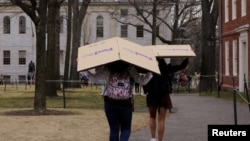Colleges and universities worldwide continue to close or move lessons online to restrict students and educators from assembling in large numbers and crowded spaces where viral COVID-19 contamination could occur.
Harvard University announced that it will transition to "virtual instruction for graduate and undergraduate classes" by the first day back from spring break on March 23.
"Students are asked not to return to campus after Spring Recess and to meet academic requirements remotely until further notice," Harvard said in a statement Tuesday.
Students on campus will also be limited to online learning and restricted movement on campus. "Non-essential gatherings" will be attended by no more than 25 people.
"Schools will communicate more specific guidance and information, and we encourage everyone to review previous guidance about both international and domestic travel," Harvard said.
Other colleges and universities that have moved instruction online include: American University, Amherst College, Barnard College, Columbia University, the University of California San Diego and Berkeley, Hofstra University in New York, Ohio State University, Princeton University, Seattle University, University of Southern California, Stanford University, and the University of Washington, according to multiple news outlets.
"Ohio State will suspend face-to-face instruction in lectures, discussion sessions, seminar and other similar classroom settings and move to virtual instruction, effective immediately and through at least Monday, March 30," the university said in a release.
"While completing classes virtually, students may choose to return to their permanent place of residence or return to campus, where appropriate social distancing and enhanced public health and hygiene measures will be actively encouraged," it said.
Many universities are retrieving their students from study abroad programs after the U.S. Centers for Disease Control and Prevention asked them "to consider" canceling study abroad programs and bring students back to the U.S.
"Given the global outbreak of novel coronavirus (COVID-19), institutes of higher education (IHE) should consider postponing or canceling upcoming student international travel programs," the CDC said. "IHE should consider asking current program participants to return to their home country. Those overseeing student international travel programs should be aware that students may face unpredictable circumstances, travel restrictions, challenges in returning home or accessing health care while abroad."
Students and parents who are studying abroad or are planning a program for the summer or fall are voicing worry on social media groups about their health, travel, tuition costs, credit hours and immigration restrictions.
"Harvard just gave students 5 days to pack all of their things, move out, and go home. Many can't go home because of costs and travel restrictions, and they've provided no guidance," tweeted Hakeem Mangulu.
"I CAN'T go home to Jamaica, especially on such short notice. The visa I'm using to work after I graduate necessitates that I stay in the U.S. until I get the authorization document in July. Where do I and the other students doing post-completion OPT go?"
OPT is short for Optional Practical Training, a visa status that allows college graduates to stay in the United States and work in the field of their study for up to three years.
Sarah Kurian, a junior at George Mason University in Virginia, told VOA she was concerned about what to do.
"Mason should switch over to online classes, too, especially with the highest university population in Virginia, and with multiple positive tests in Fairfax and Arlington it seems like the safest option," she said.
"There are so many events planned for this semester and assignments that require in-person instruction. I haven't felt comforted by school in that matter, especially because online learning could impact many students who have different learning styles and/or disabilities."
In China, where the fast-spreading virus was first reported late last year, some international students remain in isolation, as borders and flights remain closed to prevent the infection from spreading further.
The World Health Organization reported that 363 million students are out of school worldwide. Fifteen countries have ordered nationwide school closures and 14 countries have ordered localized closures.
Aline Barros and Madeline Joung contributed to this report.





